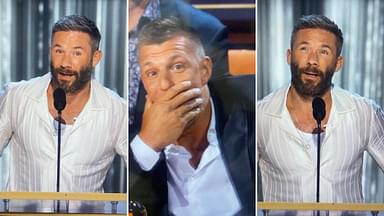The story of former New England Patriots tight end Aaron Hernandez is one of tragedy. Hernandez was on a star trajectory alongside Rob Gronkowski in Foxborough through three NFL seasons. Everything came crashing down, though, when Hernandez was arrested and convicted for the murder of Odin Lloyd.
Advertisement
Hernandez dealt with turmoil throughout his childhood that undoubtedly affected him at an older age. He couldn’t shake free from the skeletons in his closet, but that doesn’t mean he wasn’t trying to.
Former teammate Vince Wilfork revealed a first-hand perspective of Hernandez’s inner plight on Chris Long’s Green Light podcast. The 13-year NFL veteran detailed how the birth of Hernandez’s daughter, Avielle, was inspiring him to turn things around.
“He said, ‘Vince… I want to be a better person. I want to be a great father.’ And he started crying… he said, ‘I just want to be the best I can possibly be for my daughter’… [there was] so much pain that he had going on… he didn’t have an outlet. But in that moment, I was his outlet.”
Wilfork “wished” he and other Patriots could have done more to help Hernandez when he was away from the team’s facility. He also, understandably, didn’t have a full grasp on how bad Hernandez’s world was beyond the NFL.
“When he was in the locker room, he was good… when he was around us, Aaron was good. It’s when he left that building…it was a different lifestyle that he was living. I just remember that day so vividly. It’s like, man, he was crying out for help but didn’t know how to ask for it.”
Wilfork’s experience with Hernandez had a big impact on him. These days, he’s not shy about expressing himself whenever he deems it necessary.
Vince Wilfork speaks out against stereotypical male mentality
Nobody will dispute that the sports world isn’t the most conducive for someone’s mental health. You want to intimidate and dominate your opponents on the field. Any potential crack in the armor could, in the afflicted player’s mind, be detrimental to their success.
We can only wonder what words Hernandez had for himself every day. But Wilfork believes he could have gotten through his difficulties had a proper support system been in place.
“I know the type of person he could be. He was just fighting a demon [and] didn’t have the help that he needed… being a man, a lot of times, we don’t want to talk about our feelings… we can’t be soft. We can’t be vulnerable [and] we can’t be emotional… it’s so far from the truth, and I tell people all the time, ‘real men cry.'”
Sports leagues have come a long way when it comes to mental health treatment. Hernandez’s situation, unfortunately, played a role in this improvement. More advances will surely be coming in the years ahead, too. Hopefully, those efforts will allow athletes in similar mental states to avoid replicating Hernandez’s actions in the future.








